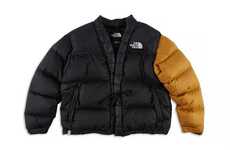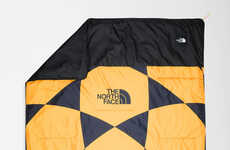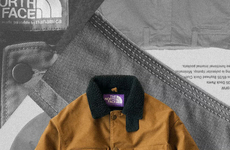
Northface's New Beanies Were Made on an Eco-Friendly Sheep Farm
Ellen Smith — November 20, 2017 — Eco
References: thenorthface & psfk
Northface's new beanies were designed with the environmentally conscious in mind, as it uses materials sourced from the innovative Bare Ranch, on the border of California and Nevada.
Bare Ranch uses a unique method of sheep rearing which takes in 4,000 metric tons of CO2, benefiting the environment as a result. The textile organization Fibershed partnered with this ranch, creating a carbon farming strategy which combines textiles and Bare Ranch's unique environmental practices. Northface's new beanies are being created through this collaborative process, as an extension of the company's efforts to implement more environmentally friendly practices.
Northface's goal is to aid in this program's expansion, inspiring other brands to reflect on practices that may be damaging to the environment.
Bare Ranch uses a unique method of sheep rearing which takes in 4,000 metric tons of CO2, benefiting the environment as a result. The textile organization Fibershed partnered with this ranch, creating a carbon farming strategy which combines textiles and Bare Ranch's unique environmental practices. Northface's new beanies are being created through this collaborative process, as an extension of the company's efforts to implement more environmentally friendly practices.
Northface's goal is to aid in this program's expansion, inspiring other brands to reflect on practices that may be damaging to the environment.
Trend Themes
1. Eco-friendly Materials - The use of materials sourced from innovative eco-friendly sheep farms presents an opportunity for businesses to create products that are environmentally conscious.
2. Carbon Farming - The collaboration between textile organizations and sheep farms to create carbon farming strategies opens up avenues for disruptive innovation in sustainable textile production.
3. Environmental Consciousness - The increasing demand for environmentally friendly products provides an opportunity for businesses to develop new offerings that align with consumer values.
Industry Implications
1. Outdoor Apparel - The outdoor apparel industry can leverage the use of eco-friendly materials to create sustainable and environmentally conscious products.
2. Textile Manufacturing - The textile manufacturing industry can explore carbon farming strategies to reduce their carbon footprint and adopt more sustainable practices.
3. Fashion Retail - Fashion retailers can cater to the growing consumer demand for environmentally conscious products by offering a variety of eco-friendly options.
1
Score
Popularity
Activity
Freshness























